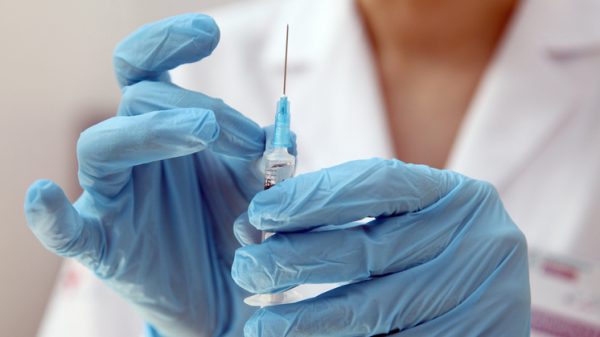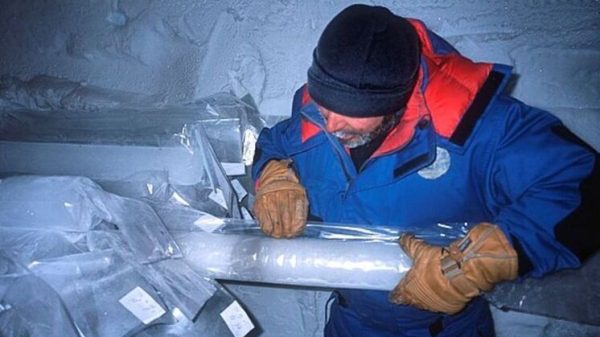 Steve Barclay has announced plans to label imported food that does not meet British welfare standards with appropriate labeling. Photo: Jamie Lorriman for the Telegraph
Steve Barclay has announced plans to label imported food that does not meet British welfare standards with appropriate labeling. Photo: Jamie Lorriman for the Telegraph
Imports of cheap food that «undercut» British farmers' costs will be labeled as reflecting their lower quality, under plans unveiled by the Environment Secretary.
Steve Barclay has warned that consumers are being tricked into buying “unethical” products through misleading packaging. and promotions in supermarkets.
In The Telegraph article below, he said there was a «lack of transparency» about products from countries with the worst animal welfare and environmental standards.
He also warned shops against displaying Union flags on shelves and freezers, implying that all products inside are British but mixed with foreign products.
Mr Barclay will speak at the Oxford Agricultural Conference on Thursday to make information public. biggest reforms to support farmers post-Brexit.
The Environment Secretary will outline plans to overhaul food labeling rules to ensure UK producers are rewarded for their best practice.
He will say shoppers are not sufficiently informed about products coming from countries with lower animal welfare and environmental standards.
“We know we need to go further to protect British farmers and empower consumers.” Mr Barclay said.
“Information about origin is required for many products on our shelves, but this does not tell us how the animal was treated or what the environmental standards are in the country where it was raised.
p>
“This means there are imported products in our stores that do not meet UK welfare standards and are not labeled to reflect this.
“This lack of transparency could undermine British farmers and lead to consumers unknowingly buying products they consider unethical. It's not fair to consumers and it's not fair to farmers.»
Mr Barclay is drawing up plans to “make packaging information clearer”, saying it will “increase consumer confidence and ensure farmers are fairly remunerated”.He added: “We will also explore how we can better identify imports that do not meet UK welfare standards, improve how origin information is provided online to help people find high quality British products and look at how we can do even more to provide advertising.» Activities such as Union Jack labels on supermarket shelves correspond to the products on the shelves.»
Ministers will now consult with businesses, including supermarket chains, on how to make changes without burdening them with additional costs.
One option is to introduce special markings that would mark cheap imports as inferior quality using a logo or standard phrase.
This will reflect changes made 20 years ago to differentiate between free-range and battery-operated eggs, which led to a huge increase in sales of the former.
Ministers have committed to ensuring that British farmers produce at least 60 per cent of the food consumed each year. Photo: Chris Ratcliffe/Bloomberg
Alternatively, overseas farmers who do not comply with British standards may be prohibited from using certain labels or descriptions on their products to highlight them.
These changes are unlikely to apply to food from Europe where regulations apply. similar rules. to the UK, but could impact countries such as Australia and New Zealand.
Mr Barclay will also hold talks with supermarkets about introducing a 'Buy UK Groceries' button on their websites to direct shoppers to products grown within the country.
>
In his speech, the Environment Secretary is set to announce the «biggest overhaul» of the farming grant system since the UK left the EU.
Landowners will receive a 10 per cent increase in payments for sustainable farming, and new grants to create and maintain habitat for rare species.
Money will also be allocated to support the introduction of new technologies, such as robotic field weeding to encourage innovation.
Under the EU's controversial Common Agricultural Policy, which the UK was required to follow before Brexit, grants were determined by the area of land rather than its use.< /p>
Ministers have made wider commitments to ensure British farmers produce less than 60 per cent of annual food consumed domestically
We want to make it easier to buy British food
We are incredibly lucky in this country to have farmers working every day to produce the high quality British produce we see on our tables. These are products that not only taste and quality, but are also produced to high British animal welfare standards and with a reduced environmental impact, writes Steve Barclay.
This government is committed to 'Stand Up Britain' and we want to make it easier for consumers to do that too. You've asked for clear and consistent labeling to help you make the right choices to support our farmers — and we deliver.
From Welsh Lamb to Stilton and Arbroath Smokies, we have products under the UK Geographical Indication (UKGI) scheme ), protecting their name, authenticity and characteristics. From early 2024, the logo will be used on all UKGI products, making it easier for consumers to identify and buy the unique product they know and love.
We have also introduced rules to prevent customers from being misled about the origin of a product's main ingredient. For example, a pork pie produced in the UK and labeled as «British» but using pork from the Netherlands must have a label stating that the pork is not British or that it is from the Netherlands. Meanwhile, mandatory egg labeling has led to a huge shift in the number of consumers buying free-range eggs: from 32 percent in 2004 to more than 70 percent today.
But we know we need to go further to protect the British people. farmers and consumer empowerment.
Information about origin is required for many products on our shelves, but it doesn't tell us how the animal was treated or what the environmental standards were in the country in which it was raised. This means there are imported products in our stores that do not meet UK welfare standards and are not labeled as such. A lack of transparency could undermine UK farmers and lead to consumers unknowingly purchasing products they consider unethical.
This is unfair to consumers. And this is unfair to farmers.
We need to act bolder and faster, which is why we will soon launch a rapid consultation to gather views on how we can make packaging information clearer to improve consumer confidence and ensure farmers are fairly compensated.
< img src="/wp-content/uploads/2024/01/f26be4deb7c31ce531e8bde7017b16ae.jpg" /> The government has introduced rules to prevent consumers being misled about the origin of the main ingredient in products sold on supermarket shelves. Photo: Alex Segre/Alami < p>We will also look at how we can better identify imports that do not meet UK welfare standards, improve the provision of origin information online to help people find high quality British products, and look at how we can do even more to enable promotional activities such as Union Jack labels on supermarket shelves match the products on the shelves.
This is part of our wider mission to support farmers from farm to fork, as committed by the Prime Minister last year.
I will soon talk about the biggest update to our farming schemes since we left the EU, laying the groundwork for increasing domestic food production alongside raising our environmental ambitions. Farmers participating in these schemes will benefit from increased payments, including premiums for actions that have the greatest environmental impact, as well as a range of new actions they can take to obtain funding.
We will also help farmers be more flexible by extending permitted development rights so that the Government can grant planning permission for larger and newer types of agricultural developments in advance.
I will also continue to support the sector in stimulating new technologies and development of innovative technologies. The research, building on more than £168 million in grants awarded to farmers last year, aims to stimulate innovation, support food production, improve animal health and welfare and protect the environment.
My message It's clear. Agriculture has been and will always be the backbone of our country. I look forward to working with farmers in the coming year to benefit from new technologies, ensure domestic food security, protect our environment and, importantly, bring agriculture back to the center of rural policy.
Steve Barclay — Secretary of State for Environment, Food and Rural Affairs
























































Свежие комментарии